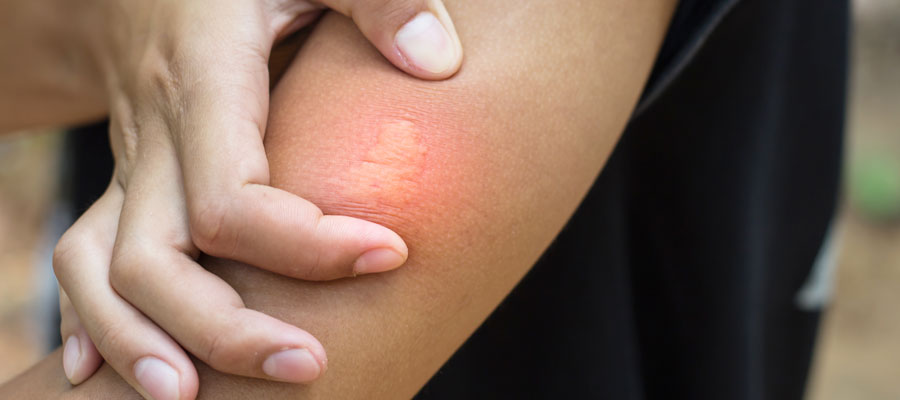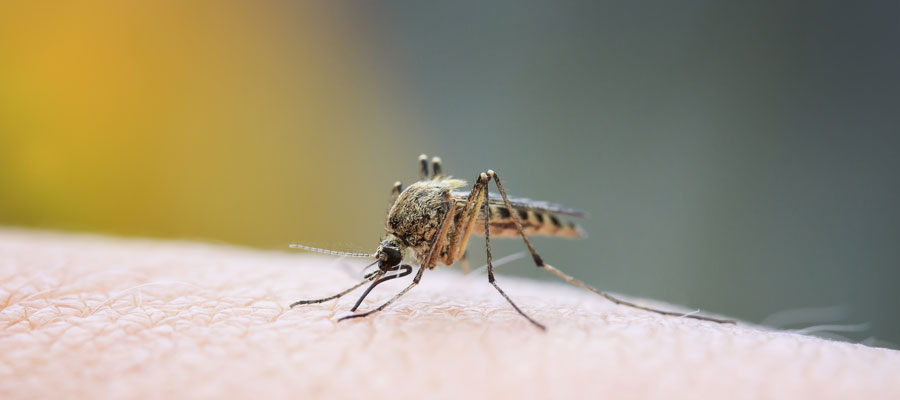In the spring and summertime here in Iowa, insects are out in full force. While this is simply a fact of life, no one wants to deal with being bitten by bugs this time of year—or ever! Even in the fall and winter, there are several biting bugs to stay aware of. At Springer Professional Home Services, we know how distressing it can be to discover you’ve been bitten by an insect. Our pest control experts are here to help you learn what insects are likely to bite or sting, as well as what you can do to prevent them.
Bugs That Bite in Iowa
Whether they bite or sting, there are a number of pests and bugs that are likely culprits behind the red, itchy bumps on your skin. The most common ones we deal with here in Iowa include:
- Bed bugs. Bed bugs are quite elusive and good at hiding, so infestations may go undetected until the population is extensive. They primarily feed on blood when their host is asleep, so you may not catch them dining on you. You may, however, awake with their bite marks, which appear in lines on your skin and can be very itchy.
- Fleas & ticks. Parasitic insect infestations usually originate from an infested animal, then find their way to human victims. On occasion, people traveling through an infested area (for example, a wooded area with lone star ticks) will be attacked by these pests, as well. Pets are common carriers of these pests.
- Mosquitoes. Nationwide, mosquitoes are very active in the spring and summer. Sometimes, we may not notice their itchy bites immediately and assume whatever bit us is inside the building with us. In the case of these pests, by the time you notice they’ve fed on you, they have left the scene of the crime.
- Bees & wasps. These stinging insects are active in the spring and summertime in Iowa. While they’d rather keep to themselves, bees and wasps alike will sting when provoked. Wasps in particular are aggressive when defending their nests, and can sting you multiple times.
- “No see ums” (biting midge flies). Anyone who has been to marshy areas has probably been attacked by these insects. About the size of a freckle, biting midges are most active at dusk and dawn. Repellants may give some relief from these annoying blood feeders.
- Mites. Mites like dust mites are incredibly small and can best be seen under strong magnification. Most cases of mites biting people in their homes can be traced back to rodents or birds nesting in the home, as these animals are their preferred hosts. Unfortunately, when their regular food source isn’t present anymore, the mites will feed on people.
- Spiders. Despite the fear associated with spiders, most species do not bite. However, there are two spiders that will bite in defense: black widows and brown recluse spiders. A bite from either of these more aggressive spiders can be very dangerous.
Have a pest problem? We can help!
Common Symptoms of Bug Bites
In general, the symptoms of bug bites or stings are very similar. Most commonly, symptoms will include red bumps at the site of the bite, itchiness, swelling, rashes, heat surrounding the bite, and other mild symptoms. When dealing with bug bites, it’s important to treat them carefully and also be on the lookout for more serious symptoms. Symptoms that may signal you are having a worse reaction—or even an allergic reaction—to the bites include substantial swelling in the eyes or throat, trouble breathing, and dizziness. Experiencing any of these symptoms requires an immediate trip to the doctor.
How to Prevent Bug Bites
If you are dealing with bug bites and cannot decipher where they are coming from, you could have a pest problem indoors. The best thing to do is to contact your local pest control experts. At Springer Professional Home Services, our experts will thoroughly inspect your property to determine any pest problems. From there, we’ll implement a pest control plan to keep the pests away for good. Contact us today to get started!


